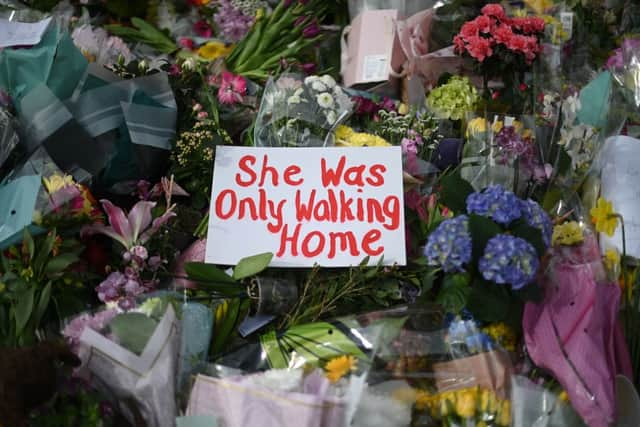Just 1% of London rape cases go to trial with two-thirds of victims pulling out, shocking report finds
and live on Freeview channel 276
Just 1% of London rape cases reach trial with almost two-thirds of victims pulling out of police investigations, a shocking report has revealed.
The damning statistics are part of the latest London Rape Review, which looks at how the crime is investigated in the capital.
Advertisement
Hide AdAdvertisement
Hide AdOne victim told the report that a police officer said to her: “‘Drunk consent was still consent’ and that as I wasn’t unconscious during the attack, I probably did consent and just regretted it.”
While a male victim said officers “referenced old fashioned, harmful stereotypes of the ‘gay cruising lifestyle’, as the rape took place in a taxi by a stranger, making me feel hopeless that any police process would work in my favour”.
London’s Independent Victims’ Commissioner Claire Waxman has called for increased independent support for rape victims and drastic improvements in how victims’ mobile phones are requested and searched during an investigation.


Conducted by the mayor’s office for policing and crime, the report looked at 450 allegations of rape made across London between 2017 to 2019.
Advertisement
Hide AdAdvertisement
Hide AdThese were compared with figures in the previous report, which studied 501 cases from 2016.
The statistics showed a rise in complainants dropping out of investigations and a lower proportion of cases reaching trial.
The report found that 65% of rape victims withdrew from investigations, either through their own choice or feeling pushed and dissuaded to, which was up from 58% in 2016.
Of those, there has been a huge rise in complainants dropping out quickly, with 64% pulling out within a month, up from 18% during the first London Rape Report.
Advertisement
Hide AdAdvertisement
Hide AdAnd a whopping 38% of alleged victims withdrew within the first week.
In addition, the most recent data has seen the proportion of rape cases reaching trial drop down from 6% to just 1%.
The review also took an in-depth look at how requests for phones and digital material are gathered and the impact this has on the victim’s ability to stay engaged in the justice process.


A female victim, who reported a rape to the police around a year later, said officers told her that “drunk consent was still consent”.
Advertisement
Hide AdAdvertisement
Hide AdShe told the report: “When I finally got up the courage to speak out and report what had happened, I was told that the police needed my phone and the office couldn’t tell me why my phone had been requested, even though my attacker filmed the attack on theirs.
“The police didn’t take his phone in the original investigation, because he lied and said there was no evidence on there, and they believed him.
“At a follow up meeting about my case a police officer told me that ‘drunk consent was still consent’ and that as I wasn’t unconscious during the attack, I probably did consent and just regretted it!
“I was made to feel like it was my fault.”
While a male victim, reported: “It was horrific to sit in that station and listen to the people who were supposed to support me and help me, ask for my phone for ‘a couple of days’ to see ‘if there was any evidence that would discredit me’ even though I was attacked by a stranger.
Advertisement
Hide AdAdvertisement
Hide Ad“I was repeatedly told about how long and intrusive the investigation process would be and how low conviction rates were, leaving me feeling completely disempowered and dissuaded.
“As one senior officer told me: ‘My wife and I sometimes get drunk, have sex and don’t remember it, that doesn’t make it rape.’”
The review has recommended that police return victims’ phones within 24 hours and that victims should be given access to free, independent legal advice to advise on matters of privacy and consent in relation to phone and personal data requests.
Advertisement
Hide AdAdvertisement
Hide AdIt also recommends that resources should be made available for independent sexual violence advisers (ISVAs) to start working with victims much earlier in the justice process and referrals for ISVAs to work with victims should be happening in a higher proportion of cases.
Ms Waxman added: “While police officers may have intended to manage victims expectations of the investigation, their heavy handed approach, which lacks any understanding of trauma is damaging victim’s confidence and trust to stay in the process.
“Victims are being pushed out of the system as they are made to feel like they are the one on trial.”
Commander Melanie Dales, the Metropolitan Police lead on public protection, said: “The Met is committed to providing the best possible service to victims of rape and sexual offences.
Advertisement
Hide AdAdvertisement
Hide Ad"We are absolutely determined to increase the number of perpetrators brought to justice by improving our processes, investigations and victim care, all the time working with partners across the criminal justice system.
"Reports of rape and sexual offences have steadily increased in recent years.
“We’ve worked hard to meet this demand whilst providing support to victims who bravely come forward and report to us.”
The Met police have announced that they are investing millions more in digital forensics to deal more effectively and efficiently with victims of crimes, including rape and serious sexual offences.
